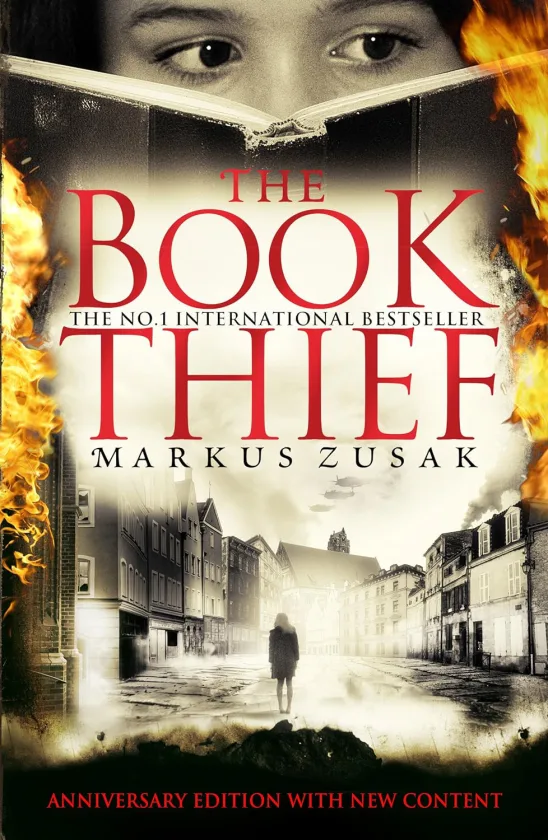
“The Book Thief” is a historical fiction novel written by Markus Zusak. It was first published in 2005. When I began reading the book, I immediately knew I would enjoy it. The writing style was refreshingly straightforward, and the unique perspective of Death as the narrator flowed seamlessly.
Death, serving as the narrator, provides the reader with insights into the characters’ forthcoming evolution. As the plot unfolds, the depth of each character gradually surfaces, revealing layers of complexity and humanity that enrich the narrative.
The Plot
Since, the book is narrated by Death, it begins with a grim scene. Liesel, a ten-year-old girl, and the protagonist of the novel, witnesses her brother’s tragic death. Subsequently, her Communist mother leaves Liesel in the care of the Hubermanns. Haunted by the memory of her brother’s passing, she is left to navigate her new life with her foster parents in a new environments at Molching.
Her foster-mother, Rosa Hubermann, is strict and loud, in stark contrast to her foster-father, Hans Hubermann, who exemplifies gentleness and patience. Liesel is tormented by frequent nightmares about her brother’s death, but Hans reliably soothes her, often staying up late to read to her. This routine eventually leads to Liesel’s learning how to read and write.
As days passed, she gets comfortable in her new surroundings and befriends a boy called Rudy Steiner. They started spending time together. For instance, they became play mates during football matches, later as a team, they started stealing eatables and eventually fell in love.
She had this insatiable desire for reading and so she started stealing books from book burnings and also from the mayor’s house, with a subtle support from his wife, Ilsa Hermann.
“No,” she said, “thank you. I have enough books at home. Maybe another time. I’m rereading something else with my papa. You know, the one I stole from the fire that night.” pg.170
Then at one night, a Jewish man, Max Vanderberg, arrives at the Hubermann household seeking refuge. She discovers that Max is also tormented by his own fears and past traumas. This shared experience of nightmares creates a bond between them. Thus, highlighting their common struggles and the pervasive fear that grips almost everyone.
The Hubermanns conceal Max in their basement. And Liesel is asked to keep this event as a family secret from nearly everyone. Till some extent, she did her job well. As the plot progresses, we see that that both she and Max develops a deep bond.
The novel vividly depicts the Nazis’ control over Germany during World War II, prompting Max to feel remorseful for endangering the Hubermanns’ lives. Therefore, after residing with them for nearly two years, he departs the household without notifying anyone. This leaves Liesel heartbroken and devastated.
He struggled to answer. “When everything was quiet, I went up to the corridor and the curtain in the living room was open just a crack…. I could see outside. I watched, only for a few seconds.” He had not seen the outside world for twenty-two months…. Max lifted his head, with great sorrow and great astonishment. “There were stars,” he said. “They burned my eyes.” pg.256
Meanwhile, the war intensifies, and the Hubermanns face increasing challenges and dangers due to their defiance of the Nazi regime.
Later, Hans is assigned to work in Essen, where he joins a team responsible for clearing up debris after air raids. During his time there, a fellow squad member develops animosity towards Hans. And one day he insists on swapping seats with him. On the same day, their bus meets a tragic accident, where he loses his life. After serving for couple of more months, he returns home and get to see his family.
Meanwhile, the Nazis continue their relentless persecution of Jews in Molching, and Liesel is distressed to see Max among the prisoners. Feeling the weight of her secret, Liesel confides in Rudy about hiding Max, a revelation she had never shared with anyone before.
Ilsa Hermann, the mayor’s wife gifts Liesel a blank notebook, encouraging her to start penning her own tale.
She reached into her bag and pulled out a small black book. Inside was not a story, but lined paper. “I thought if you’re not going to read any more of my books, you might like to write one instead. Your letter, it was…” She handed the book to Liesel with both hands. “You can certainly write. You write well…. And please,” Ilsa Hermann advised her, “don’t punish yourself, like you said you would. Don’t be like me, Liesel.” pg 351
One night, while she is engrossed in editing her book in the basement, her neighborhood becomes a target of bombing raids. Tragically, Hans, Rosa, Rudy, and the rest of the neighbors lose their lives in the onslaught.
Liesel, however, is rescued the next day. And later, she finds refuge with the mayor and his wife. Following the liberation of the concentration camps, Max returns to Molching and reunites with Liesel.
Over time, Liesel matures and eventually relocates to Australia, where she builds a family and lives to a ripe old age.
In her final moments, as Death arrives to escort her soul, he presents Liesel with the book she penned so many years ago, symbolizing the enduring legacy of her story.

Takeaway
I found this book quite enlightening. It’s one of the first war-themed books I’ve read from the perspective of someone living in Germany.
Although, through various events and interactions, we witness the ruthless persecution, discrimination, and violence directed towards Jews. The book also, effectively portrays the reality that many Germans were likewise victims of the war’s devastation. The weight of this realization has left a profound and thought-provoking impact on me. I think, I’m gonna revisit this book in the future. It’s the kind that offers fresh insights with each reading, making it a rewarding experience every time. Do take this journey of reading and experiencing “The Book Thief”, I highly recommend!



